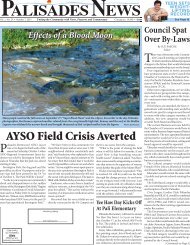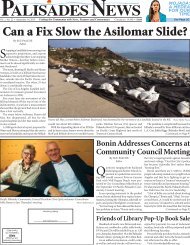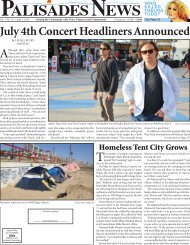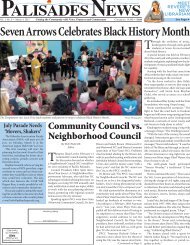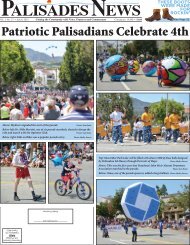Palisades-News-March-18-2015
Palisades-News-March-18-2015
Palisades-News-March-18-2015
Create successful ePaper yourself
Turn your PDF publications into a flip-book with our unique Google optimized e-Paper software.
<strong>March</strong> <strong>18</strong>, <strong>2015</strong> <strong>Palisades</strong> <strong>News</strong> Special Section — Summer Camps & Schools Page 3<br />
Local Expert Offers Stress Tips for Parents<br />
By LAUREL BUSBY<br />
Staff Writer<br />
Children today are often under pressure<br />
to “do things faster, better and<br />
earlier,” stress expert and author<br />
Amanda Enayati says. Whether it’s walking,<br />
talking, or learning to read, parents<br />
may feel pressure to help their kids move<br />
forward in building skills instead of simply<br />
enjoying the fun of childhood.<br />
But it doesn’t have to be this way. Parents<br />
can act as “protective barriers” between our<br />
competitive society and their kids—allowing<br />
children more time and space to play<br />
and relax, while also helping youngsters<br />
develop resiliency in handling life’s stresses.<br />
Here are Enayati’s top stress tips for parents<br />
and kids that she has discovered in<br />
her years investigating the subject for<br />
CNN Health, PBS Media Shift and other<br />
media outlets.<br />
1. Playtime, downtime and family time:<br />
“The young child’s job is to play,” Enayati<br />
says. “Even when kids have a moment, we<br />
try to get them to do something constructive<br />
and formal, but we need to build<br />
wide-open spaces in their day where they<br />
have nothing to do but play.” This play<br />
would also be gadget-free with things like<br />
blocks and Legos, instead of using the instant<br />
gratification of phones, iPads, computers<br />
and television.<br />
2. Build an unconditionally loving family:<br />
In her research, Enayati learned that the<br />
strongest predictor of high achievement<br />
and low behavioral problems is family<br />
On the Cover<br />
<strong>Palisades</strong> Elementary fourth graders<br />
(left to right) Letizia Oetker, Gabriella<br />
Bose, Sofia and Sasha Shull, Olivia<br />
Rodeno and Claire Monaco jumped<br />
rope to show support for American<br />
Heart Month. The annual event<br />
promotes exercise and a healthy diet, as<br />
well as awareness of a national event<br />
to prevent heart attacks and strokes.<br />
Photo: Bart Bartholomew<br />
meals. “The importance of family time<br />
and being part of a family cannot be emphasized<br />
enough. Family doesn’t have to<br />
be defined a certain way just as long as the<br />
child feels like they are part of a community<br />
or family.”<br />
3. Resting, rejuvenating and relaxing:<br />
Sleep is vital. “Lack of sleep is coordinated<br />
with high levels of anxiety and depression,”<br />
Enayati notes. She suggests maintaining a<br />
child’s routine with parts of the day to anticipate<br />
happily, so that no matter what<br />
stresses might be affecting the parents, the<br />
child still has a stable schedule.<br />
4. Teach children the art of distraction:<br />
Stress is an inevitable part of life, and part<br />
of childhood is learning to handle life’s difficulties.<br />
One way to deal with stress is simply<br />
to turn one’s attention away from it. If<br />
children practice this with a parent, they<br />
can eventually learn to do it for themselves.<br />
5. Problem solving: In discussions with<br />
children about a problem, try asking openended<br />
questions, such as “Tell me what’s<br />
happening.” Then discuss any misunderstandings<br />
a kid may have and brainstorm<br />
strategies that may help solve the problem.<br />
If similar situations have occurred in the<br />
with Sinjin<br />
Smith<br />
Amanda Enayati<br />
past, aid a child in recalling what was beneficial<br />
then that might also help now.<br />
6. Validate children’s feelings: It is important<br />
to say “I know how that feels” instead<br />
of saying “You shouldn’t be feeling that<br />
way,” Enayati says. By doing this, the parent<br />
alleviates stress and helps a child learn<br />
empathy. Another good question during<br />
conflicts is simply “How do you think the<br />
other person feels?”<br />
7. Treat children like children: “Kids are<br />
not mini-adults,” she says, so it’s important<br />
to make certain that they are not<br />
being exposed to inappropriate media, inappropriate<br />
ways of dressing or inappropriate<br />
adult issues.<br />
8. Some stress is good: It’s vital that kids<br />
learn to handle some adversity, so that<br />
they can develop resiliency and coping<br />
skills as they encounter stress throughout<br />
their lives. “There has to be some degree<br />
of legitimate suffering—not abuse . . . but<br />
growing and failing and learning from<br />
that,” Enayati says.<br />
9. Ask the big important whys: A good<br />
question to ask ourselves is “What is our<br />
value system as a society and as a family?”<br />
she said. Each family has its own value system,<br />
and it is worth taking a look at what<br />
that is. Sometimes, the value system itself<br />
may be causing stress, so identifying the<br />
value system may help address the stress.<br />
If some values aren’t what you want<br />
them to be, then alter them to what is truly<br />
important to your family. “It’s never too<br />
late. Put your stake in the ground and live<br />
your values,” Enayati says. “Sometimes that<br />
causes suffering and difficulty, but that is<br />
the good kind of suffering. You’re asking<br />
the big whys.”<br />
(Amanda Enayati’s book, Seeking Serenity:<br />
The 10 New Rules for Health and Happiness<br />
in the Age of Anxiety, was published<br />
this month, and an article about her and the<br />
book is featured on page 5 of this paper.)<br />
Optimist Club Seeks Grant Applicants<br />
Pacific <strong>Palisades</strong> Optimist Club, whose<br />
motto is “Friends of Youth” and whose<br />
goal is “Bring Out the Best in Kids,” will<br />
once again make annual grants to youth<br />
organizations based in Pacific <strong>Palisades</strong> or<br />
those that provide services that benefit<br />
youth in this community.<br />
Grants may be used for funding of a specific<br />
event, for equipment, a facility or service,<br />
and must be spent this year. Grants are<br />
not given to organizations that request continuing<br />
financial support. The application<br />
must be received no later than <strong>March</strong> 31.<br />
Award decisions will be made within<br />
two months, and grant recipients will be<br />
notified and, if possible, receive their<br />
awards at the weekly Tuesday breakfast<br />
meeting of the <strong>Palisades</strong> Optimists.<br />
Interested organizations, schools and<br />
clubs may send queries to grant committee<br />
chairman Bill Skinner (ibeeel@aol.com)<br />
or call (310) 459-8286 to receive an application<br />
and grant guidelines.<br />
Applications are also available at the<br />
Chamber of Commerce at 15330 Antioch<br />
Street. They may be returned to the Chamber<br />
or mailed to Grants Committee Chairman,<br />
Optimist Club of Pacific <strong>Palisades</strong>,<br />
P.O. Box 211, Pacific <strong>Palisades</strong> 90272.<br />
Santa Monica - 2030 Ocean Avenue – Beach Lot #4 south<br />
Pacific <strong>Palisades</strong> - Will Rogers State te t<br />
Beach ( Tower <strong>18</strong>)<br />
June 8th thru August 28th<br />
Beach Volleyball Camps: 9:00am to 12:00pm (M-F)<br />
Sand & Sea Beach Camps: 9am-12pm and, or 12-3pm<br />
(M-F)<br />
REGISTER ONLINE<br />
AT<br />
Boys & Girls ages 7-<strong>18</strong>.<br />
All skill levels welcome!<br />
www.beachvolleyballcamps.com<br />
For more information call<br />
310-940-7166<br />
or email us at info@beachvolleyballcamps.com<br />
Summertime<br />
Pool Fun<br />
After group swimming<br />
lessons, this happy<br />
<strong>Palisades</strong>-Malibu<br />
camper was allowed to<br />
play in the <strong>Palisades</strong><br />
High School swimming<br />
pool.<br />
Photo: Courtesy of<br />
<strong>Palisades</strong>-Malibu YMCA







